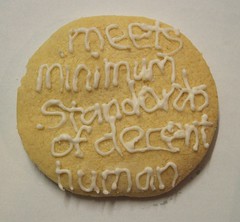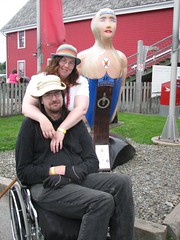Ableism is discrimination against people with disabilities, including the expression of hate for people with disabilities, denial of accessibility, rejection of disabled applicants for housing and jobs, institutionalised discrimination in the form of benefits systems designed to keep people with disabilities in poverty, etc.
1. Ableism has a dictionary definition.
The Oxford English Dictionary traces the world ableism back to 1981; likely the word was in use amongst activists before then.
[< ABLE adj. + -ISM suffix, after RACISM n., SEXISM n.2, etc. Compare ABLEIST adj., and also earlier ABLED adj. 2, ABLED n.] orig. U.S. Discrimination in favour of able-bodied people; prejudice against or disregard of the needs of disabled people. 1981 Off our Backs May 39/1 ‘Ableism’that is, the systemic oppression of a group of people because of what they can or can not do with their bodies or mindsis the result of..ignorance. 1993 R. HUGHES Culture of Complaint iii. 162 But certainly clause (3) made it clear that he was against racism, sexism, ableism, lookism and any of the other offences against social etiquette whose proscription by PC was already causing such mirth and laughter among the neo-conservatives. 1994 Canad. Woman Stud. Fall 92/2 Just as there is racism in the feminist movement, there is also ‘ablism’. Able-bodied women have not fully accepted women with disabilities. 2006 C. OYLER & B. HAMRE in C. Oyler Learning to teach Inclusively viii. 145 Although racism and sexism..are recognized as serious challenges to fairness, equity, and democracy,..ableism is often not even acknowledged.
It defines ableist as “Characterized by or exhibiting ableism.”
I mention the dictionary definition because people often claim that ableism is a made-up word that internet activists created just to annoy them, as opposed to a word with history that people with disabilities ihave been using to define their experiences for at least 30 years.
2. Ableism can be deliberate.
B. Clint Eastwood argued vehemently that 10 years was far too short a period of time to expect that businesses would follow the Americans with Disabilities Act (ADA) and painted himself as a little guy fighting back against the “sleazy lawyers” preying on “the disabled”, rather than as someone who had been breaking the law for 10 years and was now choosing to fight for his right in court to continue to do so. John Stossel argued earlier this year that the ADA might require businesses to be accessible, and this was unacceptable 20 years after the ADA had been passed. [Content warning: John Stossel]
C. Where’s the Benefit has spent the last few months detailing out how cuts in spending will affect people with disabilities. It’s hard to pick just a few examples. How about the Member of Parliament who declared that anyone who was on Twitter too much wasn’t really disabled. Or what Disability Living Allowance (DLA) actually does being misrepresented by both the government and the press?
D. Dave Hingsburger: Service Interupted:
‘Purposeful exclusion,’ I said, ‘there is no way anyone could design this, approve this and build this, without knowing that people with disabilities will never be able to use it. That makes it purposeful. The fact that only certain people can now use it make it exclusion.’
‘I’m sorry,’ she said but I interrupted.
‘This is bigotry in concrete, this is prejudice made of steel and glass, this is how builders and designers and hotel managers spit in the face of those with disabilities. They knew, they didn’t care, they did it anyways.’
E. Politicians across Canada, who make 30 second advertisements that are carefully scripted to make the best impact, don’t use the subtitling option when they upload those same 30-second scripted videos to YouTube. But I guess some politicians are okay with their videos looking like this (image description below):
Image description: Michael Ignatieff (older white dude in a sensible blue shirt and tie, his hair a bit windblown) with the caption “Don’t let anybody into Medicare”.
Actual quote: “Don’t let anybody intimidate you”.
3. Ableism has an academic definition.
Here’s a good example:
Ableism is a form of discrimination or prejudice against individuals with physical, mental, or developmental disabilities that is characterized by the belief that these individuals need to be fixed or cannot function as full members of society (Castañeda & Peters, 2000). As a result of these assumptions, individuals with disabilities are commonly viewed as being abnormal rather than as members of a distinct minority community (Olkin & Pledger, 2003; Reid & Knight, 2006). Because disability status has been viewed as a defect rather than a dimension of difference, disability has not been widely recognized as a multicultural concern by the general public as well as by counselor educators and practitioners.
Laura Smith, Pamela F. Foley, and Michael P. Chaney, “Addressing Classism, Ableism, and Heterosexism in Counselor Education”, Journal of Counseling & Development, Summer 2008, Volume 86, pp 303-309.
You can also get a degree in Disability Studies. There is a Disability History Association. There are several academic list-serves dedicated to discussion disability. You can go to disability-studies focused conferences. You can go to Deaf-studies focused conferences. You can get a degree in Deaf Studies. You can read a wide variety of academic books that discuss the history of ableism.
Or you could read people talking about their lives on their blogs. There are a lot of blogs where people talk about experiencing ableism.
4. Ableism can be accidental. This doesn’t make it okay.
A. I don’t think Google woke up one morning and decided to make some of their products completely inaccessible to certain users. I know they managed to pull it off anyway.
B. I don’t the mainstream media woke up one morning en masse and decided to ignore protests in support of the Community Choice Act. I know they managed to do it anyway. More than once.
C. I don’t think Canada’s Minister responsible for Disability-related issues deliberately sought out a wheelchair-inaccessible space for her constituency office. I do think continuing to have it 7 months after this was pointed out to her in Parliament is deliberate, though.
5. Ableism kills.
Record of the Dead: October 2010
Record of the Dead: September 2010
Betty Anne Gagnon and Murder Most Foul
Quick Hit: Parents of Disabled Children
Tracy Latimer is dead because her father is a murderer




